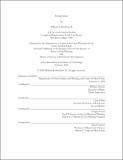Buying green
Author(s)
Bradshaw, William B., II
DownloadFull printable version (745.2Kb)
Other Contributors
Massachusetts Institute of Technology. Center for Real Estate.
Advisor
William Shutkin.
Terms of use
Metadata
Show full item recordAbstract
Green development has received much attention over the past decade, with the greatest interest coming from designers. However, the development and investment communities have been slower to adopt green principles, and the author claims that this hesitancy is related to an information gap around the costs and benefits of green building. When researchers do quantify cost or value differentials, they do it on a case study basis. By focusing on a few extraordinary examples that are ultimately placeless, these case studies create an information gap between the extraordinary performance of a few buildings (what is possible) and the ordinary performance of a typical green building (what is expected). Through the development of a simple real estate market model, the author argues that information on what is expected drives decision making in real estate, and market-based studies that are segmented by place and product type would provide more pertinent information to these industry players. If green buildings create greater value over a building's lifecycle, then green building owners should expect superior returns over time. However, no one has tested this hypothesis for a particular real estate market with a large number of green buildings. To that end, the author develops a methodology that could be used to complete such a study. This methodology is then tested on the market for green single-family homes in the Austin, Texas metro area. The author finds that homes rated as green by the Austin Green Building Program sell at a 9-10% price premium over unrated homes (further research by the author has shown that this premium is likely related to a spatial concentration of green homes in high cost areas and not due to the green rating).
Description
Thesis (M.C.P.)--Massachusetts Institute of Technology, Dept. of Urban Studies and Planning; and, (S.M. in Real Estate Development)--Massachusetts Institute of Technology, Dept. of Urban Studies and Planning, Center for Real Estate, 2006. This electronic version was submitted by the student author. The certified thesis is available in the Institute Archives and Special Collections. Includes bibliographical references (p. 79-83).
Date issued
2006Department
Massachusetts Institute of Technology. Center for Real Estate; Massachusetts Institute of Technology. Department of Urban Studies and PlanningPublisher
Massachusetts Institute of Technology
Keywords
Urban Studies and Planning., Center for Real Estate.